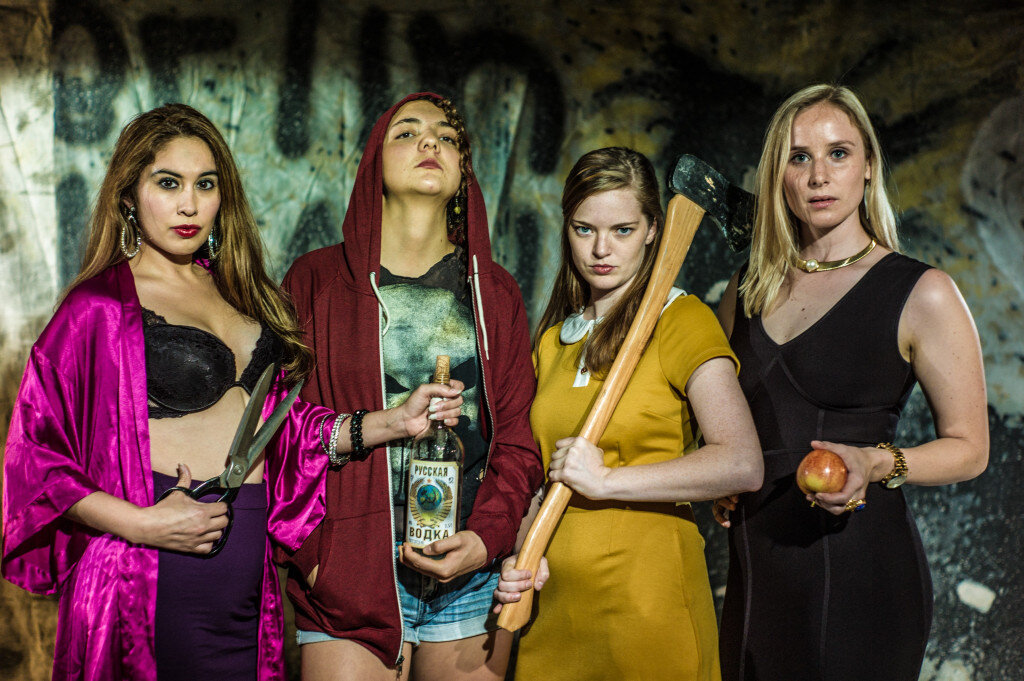The Fairytale Lives of Russian Girls by Meg Miroshnik
“Once upon a time, a woman, who was a girl, who would always be a dyevushka, set out on a journey…”
A Regional Premiere directed by Dylan Key
November 11 – December 6, 2014 at Undermain Theatre
Once upon a time (2005), in a faraway land (Russia), 20 year-old Annie knocks on the door of a distant family relation to take some business classes (and lose her American accent). What she discovers are three friends who introduce her to the glitz and corruption of modern Russia, as Soviet echoes linger just under the surface. In Meg Miroshnik’s darkly funny fairytale, the girls must combat evil potatoes, a ferocious bear, and a wicked witch, armed with only their wits, an axe, and a kick-ass closet of stilettos.
Stilettos, Bears and Baba Yaga, OH MY! The UMT basement got full of Russian folklore with a feminist twist during our 31st season, courtesy of Meg Miroshnik’s new play The Fairytale Lives of Russian Girls. Directed by Undermain Artistic Associate, Dylan Key, the play made its regional debut under Main St. in January of 2015.
When 20-something American, Annie, sojourns to Russia to reconnect with her roots and brush up on her native tongue with a “Russian for Business” course, she encounters a colorful cast of characters that show her how to get by in a Moscow caught between ancient myth and modern glitz. Her new Russian companions include Katya (a mistress making her way in the world, played by Alexandra Lawrence), Nastya (a whore who knows what’s up, played by Stephanie Cleghorn Jasso), Masha (the live-in girlfriend of a boyfriend who might actually be a literal bear, played by Mei Mei Pollitt), and Annie’s Russian host, an aging Auntie Yaroslava with ulterior motives and an acute aversion to questions (played by Gail Cronauer last seen on the UMT stage as Madame Raquin in our production of Thérèse Raquin in 1999!)
When playwright, Meg Miroshnik journeyed to Moscow with her husband (a native speaker) in 2005, she was thrilled by the exciting and fast-paced world of modern Russia. In an American Theatre article, Meg Miroshnik describes the “abrupt historical shift” she saw during her time there, saying that “a beautiful, curvy historical building would one day, suddenly, have a Revlon billboard plastered over it”. After her visit to Moscow, Miroshnik, a Minnesota native, was inspired to explore what she witnessed in Russia by writing Fairytale Lives. Throughout the play, we see the rich and colorful clash of ancient meeting modern through the eyes of American protagonist, Annie.
When in Russia, Miroshnik was also fascinated by the duality embodied in Russian women who were simultaneously hyper-feminine and extremely powerful, from their heads to their high-heels. This duality is also explored in the fierce smarts and fearless sexuality of Annie’s new friends. Though characters with descriptions like “the Girlfriend,” “the Mistress,” and “the Whore” could easily be written as the victims of their stories, in this modern fairytale mash-up, these no-nonsense women take the stage to tell their stories themselves. This was emphasized in UMT’s production as the each character stepped forward, literally taking center stage with her own spotlight to tell her fairytale in direct address (and a thick Russian dialect) to the audience.
One of the many lessons of the fairytales was to “sleep with one eye open.” And if the audience somehow managed to forget, the set (designed by Tony Award winning John Arnone) echoed that eerie reminder even when the actors were silent. The nightmarish landscape of the red and black set even featured a small upstage forest of dead, skeletal trees hung with skulls. A revolving set piece took us from the hall that led to Masha’s apartment and her beastly boyfriend in one scene to the graffitied outside of a questionable club in the next. There was even an attack by a bewitched sack of killer potatoes in Baba Yaga’s kitchen (Prop Design by Linda Noland).
Once upon a time, this regional premiere brought nightmare, whimsy and contemporary fairytale lives to Undermain’s 31st season. Or, as they would say of these characters in Russian, “zhili byli” – meaning “they lived, they were”.






























































